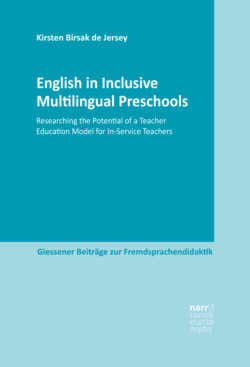Читать книгу English in Inclusive Multilingual Preschools - Kirsten Birsak de Jersey - Страница 25
На сайте Литреса книга снята с продажи.
4.3 Competences required for teaching English in preschool
ОглавлениеIt has meanwhile become an acknowledged perspective in second language acquisition research that learning a language is aptly understood as a complex communicative, social event that may not be appropriately described if you consider just on one isolated variable – for example, a feature of the grammar of a language – alone. But the procedure of isolating individual variables of the target language in order to understand language learning processes in quantitative research designs had been the prevailing research tradition in language acquisition research until about a decade ago. It was at an international conference for teachers and researchers of English in 2008 (the biannual TESOL Convention in New York) that Johannes Eckerth, a language acquisition researcher from King’s College London, challenged this hitherto prevalent approach. He recommended a new research paradigm instead that would be able to capture the complex process of language learning understood as a complex, communicative and social event in more inclusive ways. He argued as follows:
A task is always more or less adequate for a certain group of learners. Tasks are carried out by individuals with different dispositions in different settings. What individual learners do when confronted by task X is likely to be co-determined by a host of other variables. In other words, tasks, patterns of interaction, cognitive processes, and learning outcomes may not be directly related. We may therefore conclude that a generic understanding of task-based interaction and learning should be complemented by an inquiry into local settings, curricular purposes, and individual dispositions (Eckerth 2008, conference handout, n.p.; as cited in Müller-Hartmann & Schocker, 2018a, p. 99).
An awareness of the crucial role of ‘local settings’ or ‘contexts’ has since then become a major factor that researchers increasingly consider in their studies on language learning. As the research presented in this work is also set in a particular language learning context, I will need to describe the specific competences teachers need to develop so that they will be able to address their particular learners’ needs appropriately.
These competences have been identified by research that subscribes to the above mentioned contextually situated research paradigm. It has meanwhile addressed a number of different language learning contexts, ranging from primary to adult language learning. This has resulted in a generally agreed on approach to teach languages, the task approach or Task-based language teaching (TBLT) (see summaries in Müller-Hartmann et al., 2013; Müller-Hartmann & Schocker 2016a; 2018b). Even though the general principles of the task approach are established, teachers will still need to clarify what kind of tasks qualify as appropriate for their particular group of learners – in this case: preschool children – so that they have the potential to develop their communicative English language competence in a way that suits their language learning needs. Developing appropriate tasks for their particular groups of children is therefore a basic competence which preschool teachers need to develop. This is demanding. I have therefore illustrated the general task principles that research has identified by designing preschool tasks as a model, which I will use in my teacher education programme to make it more accessible for the preschool teachers who participate in my study (→ chapter 5.8).
A further competence that teachers need to develop is a solid communicative English language competence, which enables them to use the foreign language in a confident, flexible way so that they can appropriately mediate the foreign language to their groups of children (→ chapter 4.3.1).
A third important competence results from the fact that the contexts we prepare our teachers for are extremely complex: learners’ needs and teachers’ experiences are heterogeneous, depending on their individual biographies, and learning is a highly unpredictable event. Teachers therefore need to be able to reflect on what they do and relate it to the effects that their teaching has on the quality of the learning opportunities they provide for the learners. This process of reflecting practice is a substantial part of a teachers’ pedagogical content knowledge – a competence they need to develop as a constituent part of their professional competence. This is described in chapter 4.3.2.
